
Written by Caroline Junker, Communications Intern
You may not have heard of “climate justice,” but chances are that you’ll support it when you know a bit more about it—that is, if you’re like most Americans surveyed in a recent study from Environmental Science & Policy.
To understand climate justice, let’s take a step back and remember the origins of the environmental justice movement. Environmental justice recognizes that everyone deserves equal access to the benefits of a safe, clean environment and a say in decisions about environmental policies that impact their communities. This notion might seem obvious, but before the 1970s, Americans didn’t have a clear vision of how deeply racism shaped access to basic environmental rights for many minority groups. Environmental justice emerged as a new faction of activism when researchers, spurred by the Warren County protests, uncovered a vicious pattern across American cities: garbage disposal sites and pollution-causing facilities are consistently located in low-income communities and communities of color, overburdening those communities with pollution.
In this context, we can understand climate justice as a natural extension of environmental justice that focuses specifically on the impacts of climate change. Climate justice is founded on the idea of addressing climate inequality, the proven idea that the brunt of ill effects caused by climate change is often disproportionately borne by minority groups. This pattern can be seen across the globe, but also on a smaller scale within the U.S., as the researchers of “Americans’ support for climate justice” pointed out.
A clear example is redlining, the collection of racist neighborhood grading policies that compelled mortgage lenders to refuse loans to Black Americans, making it effectively impossible for Black Americans to buy houses in desirable neighborhoods or accumulate wealth from home ownership. As a result of this, many more non-White populations currently live in areas that have historically lacked funding than White populations. Walking down the streets in these neighborhoods, you may notice few green spaces but many paved surfaces, factors that make warm summer air even hotter and increase hazardous exposure to heat. Residents of these disinvested neighborhoods are more likely to be exposed to air, water, and noise pollution, and statistically live by nearly twice the density of oil and gas wells compared to neighborhoods that were ranked highly in the redlining system. Essentially, entrenched systemic racism has resulted in many non-White populations living in underserved neighborhoods that are deprived of the infrastructure and support necessary to combat the effects of climate change.
Another example that might be on your mind is the recent wildfires that devastated Los Angeles. While people from a wide variety of economic walks of life all suffered tragic losses and property damage, only a slim minority of the ultrawealthy had the deep pockets necessary to hire private firefighters. Residents of Altadena, a diverse community, might not have the financial ability to rebuild their houses. Many fear the encroachment of private equity firms, and research has shown that Black Americans are less likely than White Americans to receive relief funding from the Federal Emergency Management Agency (FEMA).
So how does climate justice intend to remedy these inequalities? The aim of climate justice is, as defined by the investigators of the study, three-pronged: to decrease the unequal negative impacts of climate change, to create solutions that include benefits for disproportionately harmed communities, and to give a voice to these communities when making decisions. If that sounds reasonable to you, then you’re on the same page as 53% of study participants, who decided they supported climate justice after reading a definition.
In this study, a sample of generally representative Americans were surveyed to learn about how their knowledge of climate justice correlated with other variables. Researchers used their responses to questions about race, climate change, politics, and culture to build a statistical picture of how these factors interact with support of climate justice.
Overall, only 19% of respondents opposed climate justice. Researchers found that people concerned about climate change in general were likely to support climate justice if they knew about it, but only 34% of Americans had heard of the term. In terms of race, people aware of racial injustice were also more likely to support climate justice, although they might not be willing to actually take political action about it. A better predictor for desire to take action was race: non-White groups are more likely to act on climate justice than White groups. To fuel further work, researchers suggested a focus on outreach and education, with the goal of incentivizing the public to pressure policymakers and institutions to enact large-scale change.
You might ask what’s been done so far to mitigate these disproportionate effects of climate change. Funding has been diverted to impacted communities through initiatives such as the Justice40 initiative under the Biden administration and the Inflation Reduction Act (IRA). Clean Air Council has worked directly with residents of overburdened communities, such as Southern Delaware County, to understand the impacts of local polluters like refineries and incinerators and work to lessen those harms. The Council aims to protect communities’ rights by collecting and spreading information, collaborating on and supporting local initiatives, and developing legal strategies to safeguard public health.
The Council also supports work to bolster communities’ climate resilience. Climate resilience is all about planning for the future. It can look like investments in infrastructure, such as planting trees to reduce heat, or forward-thinking policies, like developing disaster recovery strategies that rely on community input. These frameworks can help lighten climate-induced inequalities, and can boost every kind of community in their long-term ability to cope with climate change.
It’s clear how communities harmed by climate change would tangibly benefit from the goals of climate justice, but researchers suggest that even people who may not support climate justice could stand to benefit from its accomplishments, such as pollution reduction and job generation. In this way, climate justice can end up uplifting a broad array of people. Climate inequality is an unfortunate reality– but climate justice can present solutions.

WASHINGTON D.C. (December 17, 2024) – Today, the U.S. Department of Energy (DOE) released its public interest determination analysis, which will provide a framework for evaluating new and pending permits for exporting liquified natural gas (LNG) to countries without a free trade agreement with the United States. This announcement comes nearly a year after President Biden paused permitting decisions for LNG export facilities, which chill fracked gas for storage and transportation to other countries overseas.
The analysis found that continued LNG exports are unsustainable and unadvisable. Notably, the new analysis paints a clear picture of the environmental justice, climate, and economic harms of widespread LNG exports. LNG export terminals are concentrated in communities already burdened by highly-polluting industries, and the buildout of new LNG export facilities will only exacerbate these impacts. LNG exports will also worsen climate change through increasing greenhouse gas emissions from upstream gas production and likely offsetting the development of clean, renewable energy worldwide. Furthermore, unchecked growth of LNG exports will drive up energy costs for residential and commercial consumers while generating profits for the fossil fuel industry. The analysis found flattening international demand for LNG, with most new demand expected to be from China.
Alex Bomstein, Executive Director of Clean Air Council, issued the following statement:
“This report should end the discussion: LNG exports are bad for our pocketbooks, bad for the air we breathe, and bad for the safety of our communities. Energy independence does not mean shipping America’s resources overseas, it means harnessing and storing our abundant solar and wind energy. Clean Air Council urges the DOE to apply the study’s findings and deny the six pending permits for LNG export facilities.”
The findings from this analysis will inform future LNG export authorization decisions by the DOE and hold proposed projects to the strongest-to-date commonsense standards for determining the public impacts of LNG exports. Moreover, the study provides an important factual basis for arguments to deny permits for unlawful LNG export terminal proposals. The new analysis will replace the economic and environmental analyses used by the DOE for application decisions, which were published in 2018 and 2019, respectively.
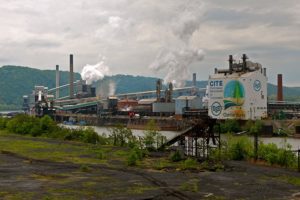
U.S. Steel has permanently shut down Battery 15 and applied for tighter limits on pollution linked to asthma
PITTSBURGH (June 4, 2024) – U.S. Steel has permanently shut down coke Battery 15, one of the oldest and most-polluting parts of the Clairton Coke Works, and has formally applied to the Allegheny County Health Department to remove the battery from its Clean Air Act permits. The closure of Battery 15, which had previously been temporarily idled, will permanently ratchet down emissions of harmful emissions such as sulfur compounds (linked to asthma and respiratory problems), benzene (linked to cancer), and fine particulates (linked to cardiovascular and other health problems). At the time of its closure, Battery 15 contained more than 10% of the remaining coke ovens at Clairton Works. The closure was confirmed in a filing with the Allegheny County Health Department on May 30, 2024.
That filing also includes an application by U.S. Steel to tighten the limit on emissions of hydrogen sulfide (a respiratory irritant), reducing the allowable limit nearly 30% from 35 to 25 grains per cubic foot of gas facility-wide.
Both of these changes were required under the terms of the historic settlement of federal Clean Air Act litigation by PennEnvironment, the Clean Air Council and Allegheny County. The lawsuit was filed in response to thousands of violations of air pollution limits after the massive fire at U.S. Steel’s Clairton Coke Works on Christmas Eve, 2018.
Zachary Barber, the Clean Air Advocate with PennEnvironment, issued the following statement:
“Pittsburghers can breathe a little easier with the news that Allegheny County’s most-toxic polluter, the Clairton Coke Works, has permanently reduced its emissions of harmful air pollutants. Tightening pollution limits for hydrogen sulfide gas and requiring the permanent closure of one of the dirtiest parts of the Clairton Coke Works will pay public health dividends to local residents for years to come.”
Alex Bomstein, the Executive Director of Clean Air Council, issued the following statement:
“When we sued U.S. Steel, our number one priority was protecting the health of residents in the Mon Valley. The closure of Battery 15 was one of the most important steps toward that goal that we achieved in our historic legal victory over U.S. Steel. While nothing can undo the damage caused by U.S. Steel’s previous emissions, these reductions will reduce future harm and move the region toward the cleaner, more wholesome air it deserves.”
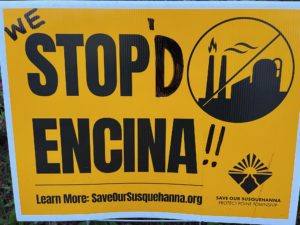
The Texas-based corporation Encina announced on April 18, 2024 that it was withdrawing its plan to develop a toxic plastics chemical recycling plant along the banks of the Susquehanna River in Point Township, Northumberland County.
The facility would have been the largest of its kind in the United States and intended to use extreme heat pyrolysis and refining processes to turn post-consumer plastic waste into benzene, a known carcinogen, xylene, and toluene. These chemicals were then to be shipped by rail, raising major air quality and safety concerns. The facility, proposed to be built in a floodplain along the West branch of the Susquehanna River, would have withdrawn 2.9 million gallons of water from the river per day, raising huge concerns about PFAS, microplastics, and other sources of contamination to a vital source of drinking water.
Encina’s permitting process was plagued with denials and deficiency letters. In March 2023, the Point Township Zoning Board unanimously rejected Encina’s application for a variance to build the facility above the height allowed for the site. In October 2023, Encina withdrew its application for a National Pollutant Discharge Elimination System (NPDES) permit after receiving a second technical deficiency letter. Community opposition culminated on April 2, 2024, when Northumberland Borough Council, which is the neighboring municipality, unanimously passed a resolution opposing the Encina facility.
Community opposition arose immediately after the facility was first announced in 2022. Residents came together to form the group, Save Our Susquehanna (SOS). Community members met with their local officials, attended municipal and county council meetings, canvassed their neighbors, and wrote letters to the editor to the local newspaper. The Council worked with SOS members to review permit applications and flag deficiencies for regulatory departments.
In a tremendous display of community power, Northumberland County residents have shown that the chemical recycling and plastics industries are not welcome in Pennsylvania. However, the fight isn’t over. Encina has been defeated, but it was part of a rapid expansion of pyrolysis and “advanced recycling” facilities that are part of a larger industry-led greenwashing effort to rebrand plastic as sustainable. This is unproven technology: many existing facilities are not economically viable and have been plagued by environmental and safety disasters. Yet we know the industry will keep trying to bring these false solutions to our communities. The Council will continue working with the community group Save our Susquehanna to monitor potential developments and to envision alternatives for a truly sustainable future.
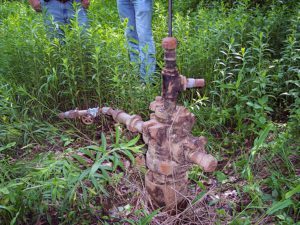
PENNSYLVANIA (April 22, 2024) – Last week, the federal government finalized a significant rule that increases minimum bonding amounts from $10,000 to $150,000 per oil and gas lease on federal land. Well bond amounts are the money that drilling companies have to put aside for eventual cleanup and plugging before being allowed to drill a new well. However, when bond amounts are less than the actual cost of plugging, taxpayers are left responsible for cleanup costs when companies go out of business and abandon their well. With over 130,000 documented orphaned wells in the United States polluting the environment and harming community health—and new wells being drilled every day without adequate bonding—this increase was long overdue.
“In raising federal lease bond amounts to reflect actual cleanup costs, the federal government is taking an important step to protect both taxpayers and the environment,” said Alex Bomstein, Executive Director of the Clean Air Council. “But while the rest of the country moves forward, Pennsylvania has regressed. In 2022, the Pennsylvania legislature passed Act 96, which capped the bond amount for conventional wells at a pittance of $2,500 per well, far below the actual cost. To protect Pennsylvanians, the Council and our partners are pursuing a joint lawsuit asking the court to rule Act 96 unconstitutional under the Environmental Rights Amendment. The federal government’s decision this month underscores how Pennsylvania’s well bonding system is broken and sacrifices community health and taxpayer dollars.”
“In updating its bonding amount, BLM is acknowledging that the current amount established more than 60 years ago was insufficient to cover the costs of cleaning up abandoned wells. This will save taxpayers from the burden of reclaiming wells after oil and gas companies neglect to clean up their polluting mess. This change reflects the reality of how expensive it is to protect people’s health and the environment from abandoned wells. We’re just asking Pennsylvania leaders to reach the same commonsense conclusions,” said Kelsey Krepps, Senior Field Organizer at Sierra Club.

Why work to reduce methane pollution?
Climate change doesn’t happen overnight, and neither will its solution. However, reducing methane emissions is one of the fastest and most effective ways of curbing climate warming in the short term. There are two reasons for this. First, methane is an extremely potent greenhouse gas. Second, methane does not last as long in the atmosphere as other pollutants such as carbon dioxide. This makes reducing methane emissions immediately a great way of tackling near-term climate warming.
The Methane Regulations
There are a number of federal initiatives aimed to reduce methane emissions from the largest industrial source: the oil and gas industry. Last December, the U.S. Environmental Protection Agency (EPA) finalized methane pollution standards for new and existing oil and gas facilities, which include gas wells, compressor stations, and storage tanks. This rule is a landmark step in reducing methane emissions from oil and gas operations of all sizes and will help protect public health and create jobs across the country.
Notably, this methane rule will set appropriate emissions monitoring requirements for wells regardless of size and require monitoring until a well is plugged. More operators will also be required to replace process controllers, used to regulate processes within gas equipment, with zero-emitting alternatives. Furthermore, the rule establishes the Super Emitter Program, which will require the EPA, third party monitoring companies, and operators to work together in identifying and fixing large emission events.
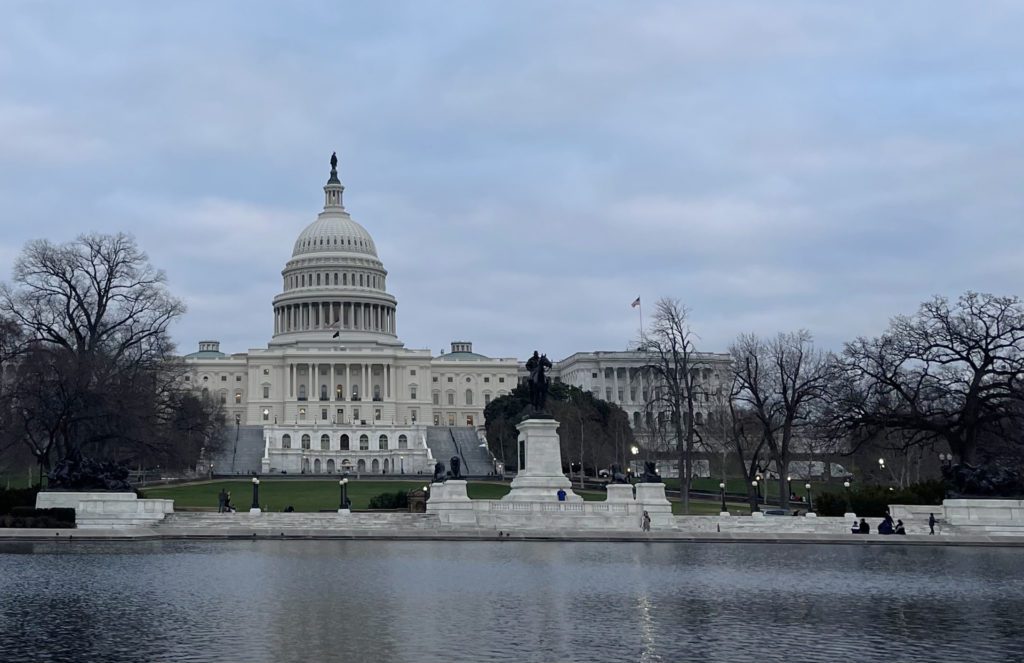
The Inflation Reduction Act (IRA) of 2022 also created the Methane Emissions Reduction Program (MERP), which aims to reduce methane emissions from the oil and gas sector. MERP establishes a Waste Emissions Charge (WEC) and revises greenhouse gas reporting requirements for the oil and gas sector, ensuring reported emissions are based on measured estimates. The WEC is a way of holding the largest polluters accountable for their pollution by levying a fee for excessive methane emissions. The WEC aims to work in tandem with the broader methane regulations; for example, operators that comply with methane regulations once they come into effect may be exempt from WEC fees.
Clean Air Council’s Involvement
Air pollution from the oil and gas industry affects everyone, especially frontline community members who are exposed to higher amounts of environment- and health-harming pollutants emitted by oil and gas infrastructure. The Council has worked with our members to prepare for public engagement opportunities. The EPA methane rule, for example, is the result of years of advocacy from the Council, our members, and our partners.
The methane rule, WEC, and the greenhouse gas reporting revision all involved a public engagement process that included a public hearing and comment period, among other opportunities. Clean Air Council supported member advocacy efforts by hosting educational webinars with partners and providing sample talking points and comments so members felt empowered to participate in the public engagement process. Most recently, the Council hosted a webinar on the WEC and supplied related comment materials.
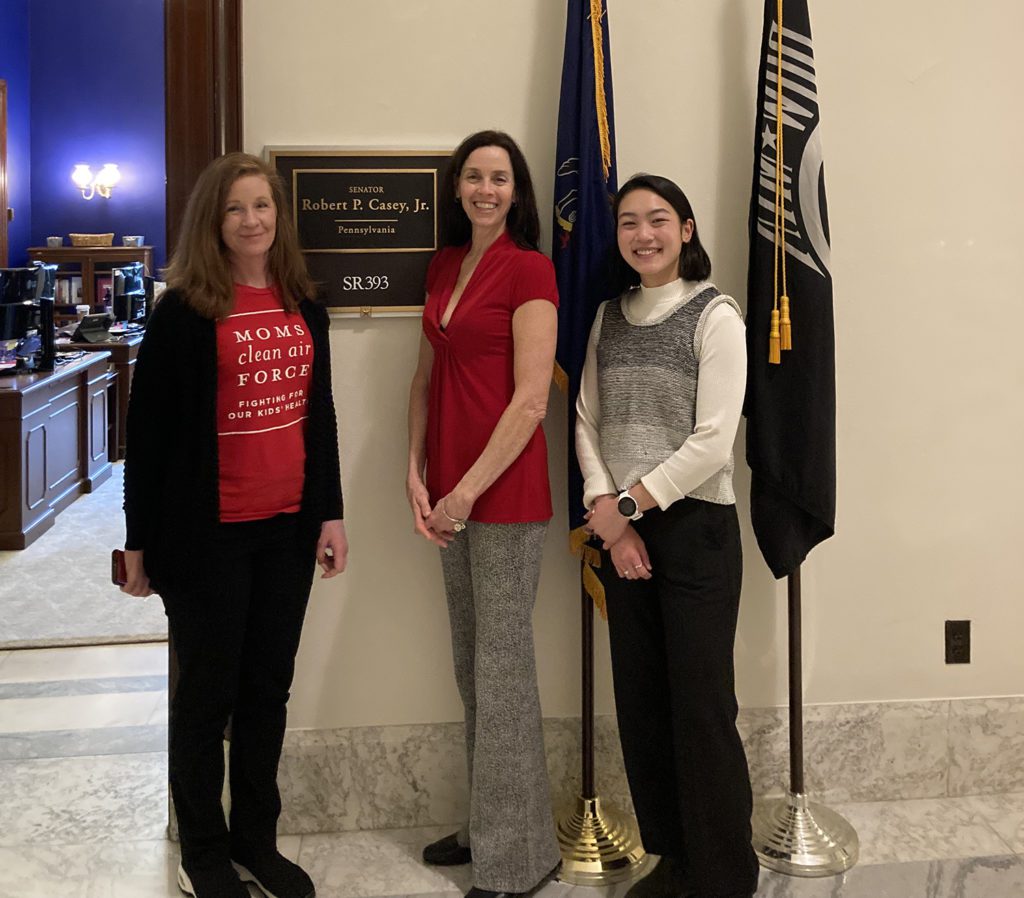
The Council has also engaged directly with elected officials to ensure they are knowledgeable about the rules and know what their constituents want. In March of 2024, staff traveled to Washington, D.C. to meet with Pennsylvania Senators Casey and Fetterman’s offices to discuss the benefits of the methane rule.
Work to ensure methane regulations are strong and protective does not end once a rule is finalized by the EPA. The EPA’s methane rule now enters the phase where each state determines how it will implement the rule via a State Implementation Plan (SIP), which the Pennsylvania Department of Environmental Protection (DEP) will need to draft and submit to the EPA. This is another opportunity for Pennsylvanians to speak up and ensure that the SIP is strong in protecting public health and the environment, as well as effective in rapidly reducing emissions.
Get involved
Even though some rules are finalized and various comment periods have closed, legislators still need to hear support for these policies from the people they represent. Members are always encouraged to contact their elected officials, at the state or federal level, to talk about why limiting methane is crucial. This support is especially important as bills continue to be introduced that would impact methane mitigation efforts. For example, House bill H.R. 1023 aims to effectively repeal MERP altogether. On the other hand, another recently-introduced bill would fund methane mitigation research. Ensuring that legislators know that their constituents care about meaningful methane reductions will protect these hard-fought regulations.
The ongoing SIP implementation of the methane rule will also create many opportunities in the near future for Pennsylvania residents to make their voice heard. Stay tuned for upcoming opportunities to show support for and influence an even stronger Pennsylvania-specific SIP that reduces as much methane as possible.

MONACA, PA (March 21, 2024) — Shell’s Beaver County plastics plant will no longer be able to operate under a construction permit. The Clean Air Act and Environmental Protection Agency (EPA) regulations require that a facility submit a Title V Operating Permit application within 12 months of commencing operation.
Despite starting operations in November 2022, the plant was still renewing its construction permit with Pennsylvania Department of Environmental Protection (PADEP). PADEP issued a letter on February 22, 2024, directing Shell Chemical Appalachia to submit a Title V Operating Permit application within 120 days. Once that application is submitted, PADEP must issue or deny the permit within 18 months.
“Since its opening in late 2022, Shell’s Beaver County plastics plant has been a serial lawbreaker, illegally emitting many tons of pollution into the air we breathe,” said Alex Bomstein, Clean Air Council Executive Director. “PADEP’s order to Shell to apply for a Title V Operating Permit for its plant sets up the public and our environment with better protection from harmful pollution, and allows the public to file comments and petition the EPA to object to any potential shortcomings in the resulting permit.”
Shell exceeded its 12-month rolling emission limits for volatile organic compounds (VOC) beginning in October 2022 through April 2023, carbon monoxide (CO) from February through March 2023, nitrogen oxides (NOx) from December 2022 through April 2023, and hazardous air pollutants (HAP) from December 2022 through April 2023. In addition to emissions violations, PADEP cited Shell for flaring violations from June 2022 through April 2023, and malodor violations from its wastewater treatment plant in January, February, and April 2023 – which included discharging benzene into the Ohio River.
Beaver County Marcellus Awareness Community (BCMAC) sent a letter to PADEP today requesting that once they receive Shell’s application it will be posted on their website so that the community has ample time for view. BCMAC will also ask that a public hearing be held to allow sufficient time for public comment.
“We’re working with local, regional and national partners who have the legal and technical experience with Title V permits to ensure that Beaver County residents will be accurately informed every step of the way,” said Hilary O’Toole, Executive Director of BCMAC. She continued, “We will be scheduling meetings and educational events throughout Beaver County to engage municipal leaders and community members.”
The PADEP must receive Shell’s Title V application by June 21, 2024.
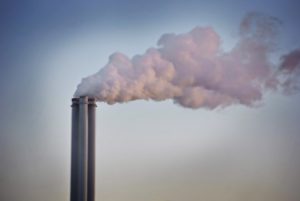
PHILADELPHIA, PA (February 7, 2024) – Responding to overwhelming scientific evidence, the U.S. Environmental Protection Agency (EPA) has acted to protect public health by lowering the annual standard for ambient air concentrations of fine particulate matter, commonly known as soot or PM2.5. These tiny particles, with diameters 30 times smaller than a human hair, can be absorbed through the lungs directly into the bloodstream, leading to respiratory and cardiovascular injuries and premature death. Growing evidence also links exposure to increased risk of dementia. EPA last reduced the standard to 12 from 15 µg/m³ over a decade ago, leading to considerable health improvements and corresponding economic benefits.
Matt Walker, Clean Air Council Advocacy Director, issued the following statement:
“Today’s announcement from the EPA is a significant win for public health and will allow millions of Americans to breathe easier. By reducing the annual National Ambient Air Quality Standard (NAAQS) by 25 percent, EPA will be saving tens of thousands of lives per year, protecting children, the elderly, and people in overburdened communities from lasting health harms. This standard will also save billions of dollars from associated health care costs and lost work days. In Pennsylvania, we anticipate substantial air quality improvements in the seven counties that are not in attainment of the new standard.
However, since there is no safe level of PM2.5 exposure, we call on EPA to soon further reduce the annual standard. Reducing the standard to the World Health Organization’s suggested 5 µg/m³ limit would save an additional 40,000 lives and billions more dollars. EPA should also reduce the 24-hour standard, which would mean less severe daily spikes in soot exposure. The U.S. can lead the way in further improving our air quality, resulting in thriving, healthy communities.”

WASHINGTON, DC (December 14, 2023) – Today, the United States Environmental Protection Agency (EPA) announced that vinyl chloride is a candidate for high-priority designation under the Toxic Substances Control Act (TSCA). The primary goal of TSCA is to regulate the introduction of new or existing chemicals into commerce to ensure that they do not pose an unreasonable risk to human health or the environment. If EPA finds vinyl chloride presents unreasonable risk, it must start a process of developing a risk management rule to eliminate all risks that it found to be unreasonable. Risk management may take many forms including, but not limited to, bans or partial bans, phase-outs, restrictions on manufacturing, processing, distributing, or disposing – including volume restrictions and prohibitions on release or discharge. The public will have the opportunity to comment on the proposed risk management rule.
Matt Walker, Clean Air Council Advocacy Director, issued the following statement:
“Clean Air Council is very pleased that EPA has selected vinyl chloride as a candidate for high-priority designation under TSCA. Vinyl chloride is a known human carcinogen and can cause other serious health harms. In communities that live in the shadow of petrochemical facilities, the harms from vinyl chloride exposure are compounded by exposures to other other toxic chemicals and stressors. EPA must consider these cumulative risks in its analysis. As the disaster in East Palestine, Ohio demonstrated, people living along rail lines used to transport vinyl chloride are in danger of significant exposures to this toxic chemical. It will be critical for EPA to evaluate these risks.”

WASHINGTON, D.C. (December 2, 2023) – The U.S. Environmental Protection Agency (EPA) has finalized methane pollution standards for new and existing oil and gas facilities that include gas wells, compressor stations and storage tanks. These updated environmental regulations will increase required air pollution inspections at oil and gas facilities while requiring widely available control technologies that do not emit climate-warming methane gas directly to the atmosphere. Methane has 87 times the global warming potential of carbon dioxide over a 20-year time period.
Additionally, this rule will require reducing smog-causing volatile organic compound (VOC) emissions as well as air toxic emissions like the known carcinogen benzene. The rule will also include a Super-Emitter Response Program that will provide information regarding air pollution incidents, and their resolutions, to impacted communities.
Joseph Otis Minott, Clean Air Council Executive Director and Chief Counsel issued the following statement:
“President Biden and the EPA are taking meaningful action with rules that set a strong foundation for cutting methane pollution from new and existing oil and gas operations. We look forward to supporting Governor Shapiro in tailoring these rules to ensure they adequately address the concerns of Pennsylvania residents near gas operations. As the second largest producer of fossil gas in the country, Pennsylvania has an outsized responsibility to cut as much climate-warming methane emissions from the gas industry as possible and better protect the health of people living near oil and gas operations.”

